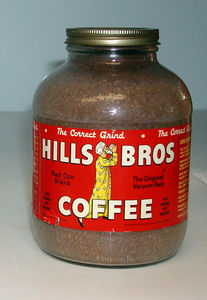 | |
| Owner | Massimo Zanetti Beverage USA |
|---|---|
| Country | United States |
| Markets | Worldwide |
| Previous owners | Nestlé Sara Lee |
| Website | http://www.hillsbros.com |
Hills Bros. Coffee is a maker of packaged coffee, founded in San Francisco.
 | |
| Owner | Massimo Zanetti Beverage USA |
|---|---|
| Country | United States |
| Markets | Worldwide |
| Previous owners | Nestlé Sara Lee |
| Website | http://www.hillsbros.com |
Hills Bros. Coffee is a maker of packaged coffee, founded in San Francisco.

The company has its origins with the sons of shipbuilder Austin Hills (1823–1905), who was born in Rockland, Maine, and ran a business in California building clipper ships. His sons were Austin Herbert Hills (1851–1933), and Reuben Wilmarth Hills I (1856–1934). [2] [3] [4]
In 1898, Edward Norton, of New York, was granted a United States patent on a vacuum process for canning foods, subsequently applied to coffee. Others followed. Hills Brothers, of San Francisco, were the first to pack coffee in a vacuum, under the Norton patents, in 1900. [5]
In 1900, Hills Bros. were the first to pack roast coffee in vacuum sealed cans. [6] They incorporated under the Hills Bros. name in 1906. [7] In 1926 Hills Bros. moved its operations to 2 Harrison Street in San Francisco, [2] a Romanesque revival building on the Embarcadero designed by George W. Kelham that is now a city landmark. [8] The roasting operations once made the surrounding area smell like coffee, according to a Key System "March of Progress" style public service film from 1945. [9] In January 2012, the building had become home to Wharton | San Francisco, a satellite campus of the Wharton School of the University of Pennsylvania. [10] A Wharton sign can be currently seen on the Embarcadero side of the building. Google LLC and the Mozilla Corporation also have offices on several floors of the building. [11]
A symbol of an Arab drinking coffee called "the taster", introduced in 1898, [12] was designed by an artist named Briggs in 1906 [2] but was replaced by a new, European-American, "taster" to represent the original founders in 1990. [13] [14] In 1976, Hills Brothers hired American singer Sergio Franchi as their TV spokesperson to introduce several lines of specialty flavors. [15] Noted character actor John Zaremba was the primary commercial spokesperson for Hills Brothers in the 1970s and early 1980s, portraying a fictional coffee bean buyer. [16]
In 1930 Hills Bros. expanded into Chicago. [2] On 2 November 1938, Hills Brothers Coffee Company filed a petition to rezone 37 ½ acres for industrial purposes to build a plant in Elmhurst, Illinois, north of the North Western tracks to where Schiller Street extended beyond Geneva Avenue. Opposition caused Hills to drop its request. [17]
During World War II, the company's metal containers were replaced with glass jars. [1] In 1984 they purchased the name and manufacturing facilities of the Chase & Sanborn Coffee Company. [18]
In 1985 Nestlé bought Hills Bros. and MJB coffee companies. [2] [19] Hills Bros. opened a new roasting plant in Suffolk, Virginia in 1988. [20] The San Francisco headquarters were closed in 1997, moving operations to Nestlé's U.S. headquarters in Glendale, California. [19] Nestlé sold Hills Bros. to Sara Lee in 1999. [2] [21] Massimo Zanetti Beverage USA purchased the brand in 2006. Massimo Zanetti Beverage USA is headquartered at the Suffolk plant. Austin E. Hills was, formerly, chairman of the board of directors. [22]
{{cite web}}: CS1 maint: archived copy as title (link)